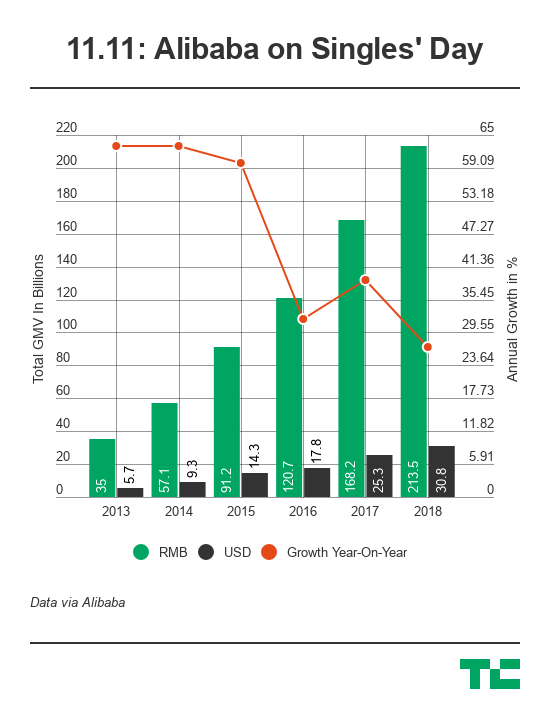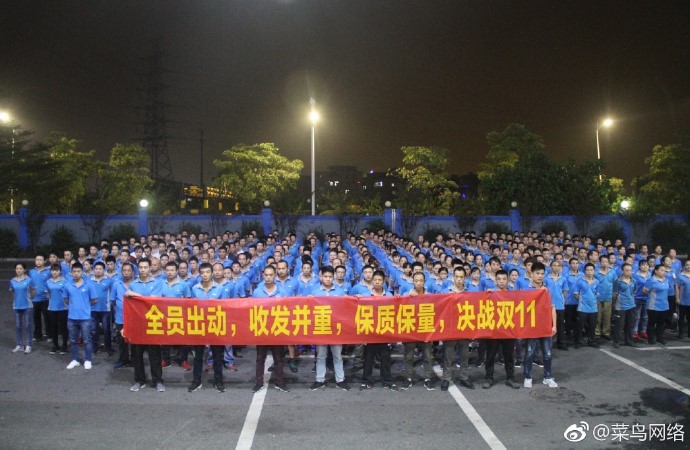Alibaba: Application of Machine Learning in Logistics

Yesterday, Alibaba reached $31B of sales in 24 hours in the Singles' Day Shopping Festival. Alibaba is able to deliver 100 million packages in 2.8 days. This miracle is enabled by its huge investments in the logistics sector and by technologies including machine learning. Will Alibaba be able to reach its aspiration of becoming the ultimate aggregator in the logistics sector in China? Is its growth in the logistics sector sustainable?
Alibaba and the Singles’ Day Shopping Festival
On November 11th 2018, Alibaba reached yet another record-breaking sales of $31B in only 24 hours. November 11th is the so-called Singles’ Day in China and is the Chinese version of Cyber Monday. This year’s Singles’ Day is by far the largest, with the gross merchandise volume surpassing twice the size of Cyber Monday and Black Friday combined in 2017 [1].

Figure 1: Alibaba’s GMV on Singles’ Day (TechCrunch)
The most challenging part of Singles’ Day, however, is not the selling of products but the order deliveries. Along the years, consumers’ requirements on delivery quality has been increasing. E-commerce platforms and online sellers are expected to deliver orders faster, at lower costs, and with better accuracy. For the Singles’ Day in 2017, Alibaba delivered 100 million packages in only 2.8 days [2].
Figure 2: Deliverymen getting ready for Singles’ Day on November 10th 2018
Alibaba’s Aspiration and Strategy in Logistics
In order to meet consumers’ ever-increasing requirements, Alibaba has been applying big data and machine learning to optimize logistics processes including order prediction, warehouse management, transportation and last-mile delivery. As an aggregator, Alibaba is able to leverage network effect and collect massive amount of data from different sources, e.g. its major e-commerce websites Taobao and Tmall. For instance, Alibaba analyzes data of all historical orders to understand the demand for various products across different geographies in China. By machine learning, it generates precise order predictions which help online sellers to pre-load their warehouses with certain amounts of inventories, so as to avoid blocking and starving during the busy season of Singles’ Day [3].
With the impressive performance in the arena of logistics, what should Alibaba do to reach the next level of excellence? From Day One, Alibaba has the aspiration of becoming the ultimate aggregator in the logistics sector. In 2013, Alibaba launched Cainiao Logistics which has now become the largest unicorn company in logistics industry through a series of acquisitions. On September 13th 2018, Cainiao announced its investment in YiLiu Technology, an Internet of Things (IoT) company in the logistics sector [4]. Internet of Things (IoT) is a technology that attach tracking devices on vehicles and goods to digitalize and visualize the whole logistical process. YiLiu Technology uses the IoT technology to help cargo owners and truck owners to optimize routes, to dispatch cargo and drivers, and to eventually digitalize the entire supply chain. By investing in YiLiu, Alibaba now has access to logistics data of millions of Chinese trucks, which, once combined with Alibaba’s existing data portfolio, will enable it to further identify opportunities of efficiency improvement and cost savings.
This will not benefit Alibaba alone. The logistics industry in China is extremely fragmented with millions of small-to-mid sized companies. This traditional industry has been suffering from low efficiency and hard-to-manage costs. Cainiao aims to transform the industry with its possession of data and technology, so as to decrease the logistics costs nationwide. “The manufacturing industry will benefit from improving profitability if we are able to decrease the logistics costs to lower than 5% of GDP. This is what Cainiao and the logistics industry should do to contribute to the nation.” Jack Ma, the famous co-founder of Alibaba, said so in a conference in May 2018 [5].
What’s Next?
The Singles’ Day Shopping Festival was created by Alibaba in 2009. After ten years of ramp-up, I believe Alibaba has almost reached the upper limit of logistics improvement in terms of delivery speed. As next step, their goal is to scale the impact to other companies and other industries. As I look into Alibaba’s future game plans, I have two major concerns.
Firstly, the realization of Alibaba’s logistics miracle is largely dependent on the low-cost labor in China. As we can see from the picture above, deliverymen are critical to ensure that 100 million packages can be delivered in 2.8 days. However, the labor cost in China has been on the increase in recent years, which is why many multinational companies moved their headquarters and factories away from China to Southeast Asian countries. For next step, is it possible for Alibaba to improve labor productivity through machine learning and Internet of Things, so that the same delivery efficiency can be reached with fewer deliverymen?
Secondly, industry-wide data sharing is critical for Alibaba / Cainiao to reach their aspirations. With larger and broader data sets, Alibaba can have a better grasp of logistics optimization throughout the value chain and improve their machine learning algorithm accordingly. But in the era of internet and connectivity, data has become the core assets of most companies, so it is unlikely for other players to share their data with Alibaba willingly. Alibaba aims to become the aggregator of logistics industry, but it is still the key competitor to other players after all. By far, Alibaba has successfully gained access to the data of many players via investments or acquisitions, but is it sustainable?
(800 words)
References
[1] TechCrunch, “Alibaba sets new Singles’ Day record with $31B in sales, but growth is slowing”. https://techcrunch.com/2018/11/11/alibaba-singles-day-2018-31b/, accessed Nov 2018
[2] Tmall Weibo. https://www.weibo.com/u/3391153442?is_search=0&visible=0&is_all=1&is_tag=0&profile_ftype=1&page=1#feedtop, accessed Nov 2018
[3] LeiPhone, “Interview with Lijun Zhu, Senior Algorithm Expert at Cainiao Logistics – What can algorithm optimization bring to smart logistics?”. https://www.leiphone.com/news/201706/xBpbhuSWw424iTjD.html, accessed Nov 2018
[4] Caijing.com, “Cainiao Logistics invested in YiLiu Technology, expecting Internet of Things technology to expedite digitalization and smartification of logistics industry”. http://tech.caijing.com.cn/20180913/4514071.shtml, accessed Nov 2018
[5] SooToo, “Cainiao is aiming to build national smart logistics network”. http://www.sootoo.com/content/675994.shtml, accessed Nov 2018




The question of how Alibaba should proceed in terms of applying machine learning and technological innovations towards logistics planning was super interesting, particularly in light of their acquisitions and expansive collection of data both around consumers and delivery logistics. I also wonder how they can apply this technology and data as the Chinese population shifts and adapts so rapidly (e.g. rural to urban, road and infrastructure changes), and what additional channels (e.g. partnerships, acquisitions, innovations like drones) they can use to drive for efficiencies and scale in the logistics space.